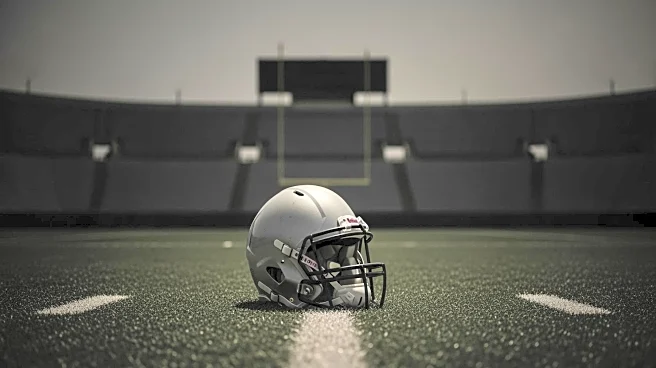What's Happening?
Marshawn Kneeland, a defensive end for the Dallas Cowboys, tragically passed away at the age of 24. According to the Texas Department of Public Safety, Kneeland died from a self-inflicted gunshot wound
following a police chase. The incident began when troopers attempted to stop a vehicle for a traffic violation, leading to a pursuit that was later terminated after losing sight of the vehicle. Kneeland's car was found abandoned and involved in a crash. Police discovered Kneeland deceased near the crash site. The Cowboys expressed their sorrow over the loss, describing Kneeland as a beloved teammate. His agent, Jonathan Perzley, also released a statement mourning the loss of his client and friend.
Why It's Important?
The death of Marshawn Kneeland is a significant loss for the Dallas Cowboys and the NFL community. Kneeland was a promising player who had recently scored his first career touchdown. His passing highlights the mental health challenges faced by athletes, emphasizing the need for support systems within sports organizations. The incident may prompt discussions on the pressures faced by professional athletes and the importance of mental health resources. The Cowboys, currently on a bye week, will have time to process the tragedy, but it underscores the emotional impact such events can have on a team and its performance.
What's Next?
The Dallas Cowboys and the NFL community are likely to engage in discussions about mental health support for players. The team may consider implementing additional resources or programs to address mental health issues. The NFL could also review its policies and support systems to better assist players in need. As the Cowboys navigate this difficult time, they may hold tributes or memorials to honor Kneeland's memory. The incident may lead to broader conversations about athlete welfare and the pressures of professional sports.
Beyond the Headlines
Kneeland's death raises ethical and cultural questions about the support systems available to athletes. It highlights the stigma surrounding mental health in sports and the need for open conversations about mental well-being. The tragedy may influence long-term changes in how sports organizations address mental health, potentially leading to more comprehensive support structures. It also serves as a reminder of the human aspect of athletes, who often face immense pressure both on and off the field.









